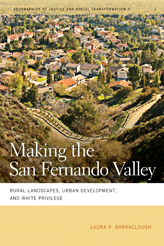
In the first book-length scholarly study of the San Fernando Valley—home to one-third of the population of Los Angeles—Laura R. Barraclough combines ambitious historical sweep with an on-the-ground investigation of contemporary life in this iconic western suburb. She is particularly intrigued by the Valley’s many rural elements, such as dirt roads, tack-and-feed stores, horse-keeping districts, citrus groves, and movie ranches. Far from natural or undeveloped spaces, these rural characteristics are, she shows, the result of deliberate urban planning decisions that have shaped the Valley over the course of more than a hundred years.
The Valley’s entwined history of urban development and rural preservation has real ramifications today for patterns of racial and class inequality and especially for the evolving meaning of whiteness. Immersing herself in meetings of homeowners’ associations, equestrian organizations, and redistricting committees, Barraclough uncovers the racial biases embedded in rhetoric about “open space” and “western heritage.” The Valley’s urban cowboys enjoy exclusive, semirural landscapes alongside the opportunities afforded by one of the world’s largest cities. Despite this enviable position, they have at their disposal powerful articulations of both white victimization and, with little contradiction, color-blind politics.